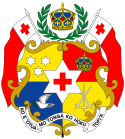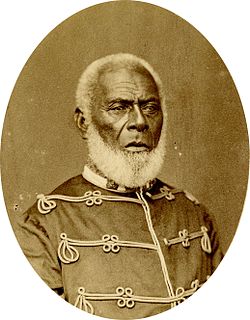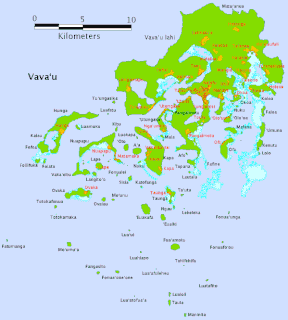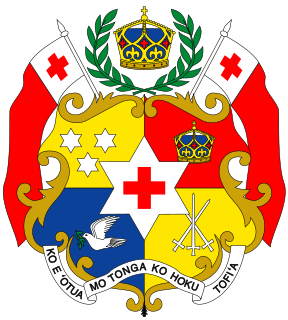 |
|---|
| Constitution |
| Administrative divisions |
Constituencies of Tonga are used for elections to the Legislative Assembly of Tonga. [1]
 |
|---|
| Constitution |
| Administrative divisions |
Constituencies of Tonga are used for elections to the Legislative Assembly of Tonga. [1]

The history of Tonga is recorded since the ninth century BC, when seafarers associated with the Lapita diaspora first settled the islands which now make up the Kingdom of Tonga. Along with Fiji and Samoa, the area served as a gateway into the rest of the Pacific region known as Polynesia. Ancient Tongan mythologies recorded by early European explorers report the islands of 'Ata and Tongatapu as the first islands having been hauled to the surface from the deep ocean by Maui.

George Tupou I, originally known as Tāufaʻāhau I, was the first king of modern Tonga. He adopted the name Siaosi, the Tongan equivalent of George, after King George III of the United Kingdom, when he was baptized in 1831. His nickname was Lopa-ukamea, meaning iron cable.
The Tuʻi Tonga is a line of Tongan kings, which originated in the tenth century with the mythical ʻAhoʻeitu, and withdrew from political power in the fifteenth century by yielding to the Tuʻi Haʻatakalaua. The title ended with the death of the last Tu'i Tonga, Sanualio Fatafehi Laufilitonga, in 1865, who bequeathed the ancient title and its mana to his nephew, Fatafehi Tu'i Pelehake, who was the Tu'i Faleua, or Lord of the Second House. Tu'i Pelehake surrendered the title and its privileges to his father-in-law, King George Tupou I, who united its power and prestige with that of the Tu'i Kanokupolu, Tu'i Vava'u, and Tu'i Ha'apai titles to establish the modern-day institution of the Tongan Crown. Though the title is no longer conferred, the ancient line remains unbroken and is represented by the noble title of Kalaniuvalu.

Vavaʻu is an island group, consisting of one large island and 40 smaller ones, in Tonga. It is part of Vavaʻu District, which includes several other individual islands. According to tradition, the Maui god created both Tongatapu and Vavaʻu, but put a little more effort into the former. Vavaʻu rises 204 metres (669 ft) above sea level at Mount Talau. The capital is Neiafu, situated at the Port of Refuge.

Haʻapai is a group of islands, islets, reefs, and shoals in the central part of Tonga. It has a combined land area of 109.30 square kilometres (42.20 sq mi). The Tongatapu island group lies to its south, and the Vavaʻu group lies to its north. Seventeen of the Haʻapai islands are inhabited. Their combined population is 5,419. The highest point in the Ha‘apai group, and in all of Tonga, is on Kao, which rises almost 1,050 metres (3,440 ft) above sea level.

Peau Vavaʻu Ltd was an airline based at the Pacific Royale Hotel in Nukuʻalofa, Tongatapu, Tonga. It operated domestic services. Its main base was Fuaʻamotu International Airport, Tongatapu, with hubs at Lifuka Island Airport and Vavaʻu International Airport.

The Legislative Assembly of Tonga is the unicameral legislature of Tonga. The assembly has 25 members in which 17 members elected by majority of the people for a 5-year term in multi-seat constituencies via the single non-transferable vote system. There are 8 members elected by the 33 hereditary nobles of Tonga. The Assembly is controlled by the speaker of the House who is elected by majority of the elected members of Parliament and constitutionally appointed by the king.
Fīnau ʻUlukālala was a dynasty of six important hereditary chiefs from Vavaʻu, currently in the kingdom of Tonga. The dynasty began sometime in the 18th century and died out in 1960. The chief's original estate was Tuʻanuku, and his nickname and that of the village is Tavakefaiʻana.

Early general elections under a new electoral law were held in Tonga on 25 November 2010. They determined the composition of the 2010 Tongan Legislative Assembly.

The 2010 Tongan Legislative Assembly was established following the 2010 elections, the first under a new system which saw the majority of seats elected by universal suffrage. The Taimi Media Network described it as "Tonga's first democratically elected Parliament".

General elections were held in Tonga on 1 May 1981. Seven nobles were elected by their peers, whilst a further seven People's Representatives were publicly elected.
Niuas is an electoral constituency which sends one representative to the Legislative Assembly of Tonga. It covers the islands of Niuafoʻou and Niuatoputapu.

General elections were held in Tonga on 27 November 2014. All twenty-six elected seats in the single-chamber Legislative Assembly were up for election, although the monarch, acting on the advice of his Prime Minister, retains the possibility to appoint members to Cabinet from outside Parliament, thus granting them a non-elected ex officio seat in Parliament.

General elections were held in Tonga on 16 November 2017 to elect 17 of the 26 seats to the Legislative Assembly. King Tupou VI dissolved the Assembly on 25 August 2017 on the advice of its Speaker, Sialeʻataongo Tuʻivakanō, who claimed that Prime Minister ʻAkilisi Pohiva was attempting to claim powers held by the King and Privy Council within Cabinet.

General elections were held in Tonga in 1930.

General elections were held in Tonga in May 1948.

General elections were held in Tonga on 28 May 1954. An amended electoral law had been passed in 1951 to allow women to vote for the first time in the elections; however, a technical error in the legislation was discovered that meant the franchise could not be extended in time to take effect for the 1954 elections.

General elections were held in Tonga on 27 May 1963.

General elections were held in Tonga in May 1969.

General elections were held in Tonga in 1951